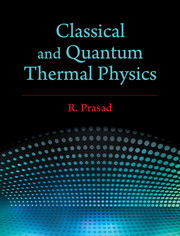Book contents
- Frontmatter
- Dedication
- Contents
- Figures
- Tables
- Preface
- Acknowledgments
- 1 The Kinetic Theory of Gases
- 2 Ideal to a Real Gas, Viscosity, Conductivity and Diffusion
- 3 Thermodynamics: Definitions and the Zeroth Law
- 4 First Law of Thermodynamics and some of its Applications
- 5 Second Law of Thermodynamics and some of its Applications
- 6 Tds Equations and their Applications
- 7 Thermodynamic Functions, Potentials, Maxwell's Equations, the Third Law and Equilibrium
- 8 Some Applications of Thermodynamics to Problems of Physics and Engineering
- 9 Application of Thermodynamics to Chemical Reactions
- 10 Quantum Thermoynamics
- 11 Some Applications of Quantum Thermodynamics
- 12 Introduction to the Thermodynamics of Irreversible Processes
- Index
1 - The Kinetic Theory of Gases
Published online by Cambridge University Press: 23 July 2017
- Frontmatter
- Dedication
- Contents
- Figures
- Tables
- Preface
- Acknowledgments
- 1 The Kinetic Theory of Gases
- 2 Ideal to a Real Gas, Viscosity, Conductivity and Diffusion
- 3 Thermodynamics: Definitions and the Zeroth Law
- 4 First Law of Thermodynamics and some of its Applications
- 5 Second Law of Thermodynamics and some of its Applications
- 6 Tds Equations and their Applications
- 7 Thermodynamic Functions, Potentials, Maxwell's Equations, the Third Law and Equilibrium
- 8 Some Applications of Thermodynamics to Problems of Physics and Engineering
- 9 Application of Thermodynamics to Chemical Reactions
- 10 Quantum Thermoynamics
- 11 Some Applications of Quantum Thermodynamics
- 12 Introduction to the Thermodynamics of Irreversible Processes
- Index
Summary
Kinetic Theory, Classical and Quantum Thermodynamics
Two important components of the universe are: the matter and the energy. Interplay between them creates a variety of processes and phenomenon. In order to understand and appreciate the vast spectrum of happenings around us, it is required to know more intimately the properties of the different forms of matter and their interactions with energy. This may be approached in two different ways. In the first approach, often called the microscopic approach, some assumptions about the nature of the matter present in the universe is made and then the well-known and well-established laws of interaction are applied between the assumed entities of the matter to explain the observed natural phenomenon. The kinetic theory of matter and the statistical mechanics (or quantum statics) are the examples of the microscopic approach. In kinetic theory of matter it is assumed that matter is made of elements, which in turn are made of molecules that are in motion. Molecules of an element are all alike, while molecules of different elements are different. Molecules are themselves assumed to be made of atoms. Having made assumptions about the constitution of the matter, the kinetic theory applies the laws of Newtonian mechanics, like the law of conservation of energy, law of conservation of liner momentum, the law that states that the rate of change of momentum is equal to force, etc. to the molecules and obtain expressions for average properties of the system, like the pressure exerted by a gas, etc.
In the case of quantum statics or statistical mechanics, it is assumed that matter is made of different kinds of identical particles or entities; the number of each type of entity in a given piece of matter is very large and, therefore, the entities follow the laws of quantum statistics. In quantum statistics, the entities can have different discrete energies and their energy distributions are given by distribution laws. The average properties of a given piece of matter may be obtained by the application of the relevant quantum distribution law.
- Type
- Chapter
- Information
- Classical and Quantum Thermal Physics , pp. 1 - 48Publisher: Cambridge University PressPrint publication year: 2016



